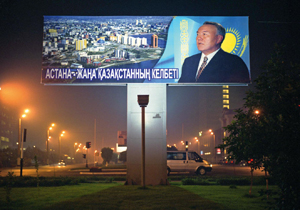First they came for the bankers
 Nazarbayev: always a big-picture politician
Nazarbayev: always a big-picture politicianFAMILY ties can make or break a person in Kazakhstan. They help when it comes to advancing a career, be it in business or in politics. Kazakh tradition requires you to support your relatives whenever possible. If your family lacks clout, an alternative is to attach yourself to a well-placed patron. One drawback with this system, however, is that it works both ways: if the patron falls for whatever reason, it almost always leads to the downfall of everyone connected with him.
This helps explain the shocking, unprecedented numbers of Kazakhstani officials and businessmen in trouble in recent months. Ekspert Kazakhstan, a business weekly, this month carried a picture of a faceless man in a dark suit and tie, covered with horizontal white stripes and the headline “Everyone is being put in clink!” Some older people talk of troubling echoes of Stalin’s purges in the late 1930s.
That is ludicrous. Nobody has died. But a seemingly arbitrary wave of arrests—mostly on charges of corruption and embezzlement—and the obvious lack of legal protection against it have fostered a climate of fear. The timing seems bizarre. Kazakhstan is about to achieve a long-coveted badge of international respectability, by taking over in 2010 the one-year chairmanship of the Organisation for Security and Co-operation in Europe (OSCE). It won this honour thanks to the government’s pledge to improve legislation in areas such as the freedom of the press and political parties.
Now, because of the extra attention it will bring, the OSCE role may actually backfire. Kazakhstan could find its international image even murkier. But domestic politics now trump any diplomatic concerns. Yevgenii Zhovtis, a well-known human-rights activist, detects signs of “a brutal internal war among the elites”, to clear the way for a successor to the long-serving authoritarian president, Nursultan Nazarbayev, whose term ends in 2012. Mr Zhovtis says it is anybody’s guess to what extent Mr Nazarbayev himself is involved. The political turmoil was triggered in part by the impact of the global economic crisis on Kazakhstan, an oil-rich country that was booming until 2007, and the weakened state of both private and state companies. In February this year BTA Bank, then Kazakhstan’s largest bank, was nationalised, ostensibly to prevent its collapse, and its chairman, Mukhtar Ablyazov, a one-time opposition leader, stripped of his position. He left the country for exile in London from where he has been railing against the nationalisation, while avoiding a criminal investigation into alleged racketeering and money-laundering.
Since other members of his management team also left hastily, the authorities are vigorously pursuing other leads, spreading fear among the remaining BTA employees. A letter to an opposition newspaper described a BTA employee so frightened by a summons from the authorities that she went into hiding. The letter claimed that the authorities then detained her mother instead and held her for three days. Overall, more than a dozen BTA managers have been arrested and are expected to go on trial some time this summer. A number of senior officials have also been arrested on charges of corruption, including the deputy ministers of environment and defence and the deputy head of the statistics agency. A few other bank and company managers fearing the same fate have chosen to disappear.
The biggest shock, however, was the arrest in late May of Mukhtar Dzhakishev, the much-respected head of the state nuclear agency, Kazatomprom, and friend of Mr Ablyazov. Mr Dzhakishev was accused of stealing Kazakhstan’s uranium deposits, which, given the strict oversight of the industry, seems unlikely. His deputies are being held as potential witnesses and are said to have been mistreated. In all, eight of his associates have been arrested.
Despite official claims that all these cases are unrelated criminal investigations, most observers see a political motive, even if it is unclear who is to benefit. The crackdown has dented foreign investors’ confidence in the country and is causing many to wonder who is next.
